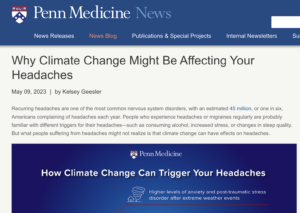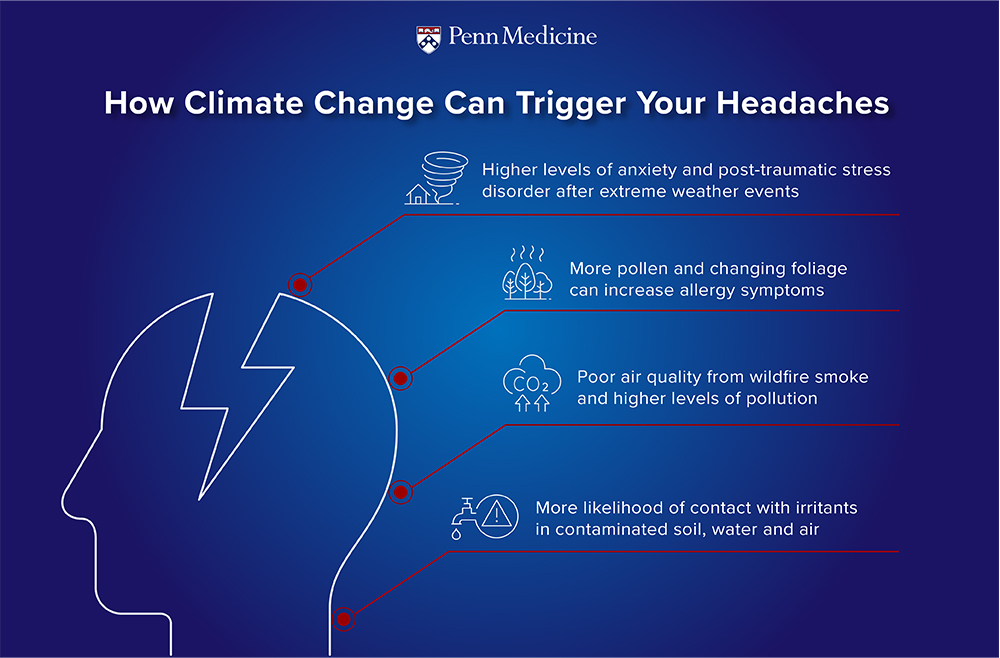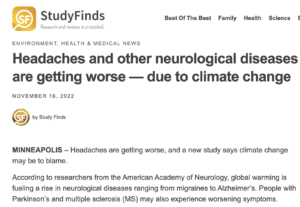https://www.pennmedicine.org/news/news-blog/2023/may/headache-and-climate-change
Why Climate Change Might Be Affecting Your Headaches
by Kelsey Geesler
Recurring headaches are one of the most common nervous system disorders, with an estimated 45 million, or one in six, Americans complaining of headaches each year. People who experience headaches or migraines regularly are probably familiar with different triggers for their headaches—such as consuming alcohol, increased stress, or changes in sleep quality. But what people suffering from headaches might not realize is that climate change can have effects on headaches.
How Can Climate Change Cause Headaches?
According to the Environmental Protection Agency, rising global average temperature continue to impact widespread changes in weather patterns, and extreme weather events—such as heat waves and hurricanes—are likely to become more frequent or more intense. Experts suggest that the stress of these events can trigger headaches.
“Not only can experiencing an extreme storm itself be stressful, but the aftermath, where we have to deal with injuries, destruction to our homes or other property, and the loss of our possessions can add to that stress said Marilyn Howarth, MD, an adjunct associate professor of Pharmacology at the University of Pennsylvania Perelman School of Medicine and director of the Community Outreach and Engagement Core with the Center of Excellence in Environmental Toxicology (CEET). “This stress can cause people who are already susceptible to headaches to experience them more frequently or more acutely.”
With the increase of weather events that cause flooding, like hurricanes and other intense downpours, there is also an increased likelihood that storage facilities for chemicals and other hazardous materials may be disturbed, which could cause spills and leaks that can contaminate the soil, water, and air.
“A number of common chemicals, like solvents, are known to cause irritation in the nose and throat, and headaches, and if a high enough concentration of these chemicals makes it into the soil around our homes, or into our drinking water, exposure can cause headaches in some individuals,” Howarth noted. “Individuals may also come into contact with contaminated water while attempting to access their homes or evacuate the affected area, which could trigger headaches.”
Research also suggests that rising temperatures associated with climate change have an impact on changing foliage and pollen in some areas.
“These changes can lead to an increase in pollen that already exists in an area, or the introduction of a new kind of pollen in an area that has never seen it before,” Howarth elaborated. “People with existing allergies may see them get worse, and people who never experienced allergies in the past might develop them.”
A recent study from Holly Elser, MD, PhD, a Neurology resident at Penn Medicine, illustrates an increase in emergency department visits for patients diagnosed with headaches following wildfires in California. “Wildfires are most common in the Western U.S., with climate change driving the intensification and length of wildfire seasons. But even Mid-Atlantic states like Pennsylvania and New Jersey are subject to the effects of wildfires,” Elser said, noting a “red flag” warning in the Philadelphia region, just last month, resulting from warm temperatures, combined with very low humidity and strong winds, caused an increased risk of fire danger.
…
Children may be particularly susceptible to climate change impacts such as increased air pollution exacerbating asthma and flooding redistributing chemicals and causing mold growth which can also exacerbate asthma.
#
Global warming can cause headaches
Headaches are not lethal every time, but their recurring episodes can cause huge discomfort and hinder our daily activities and productivity. Other than common factors like alcohol, stress, and poor sleep, now global warming has also become a major factor that can trigger headaches, found the University of Pennsylvania.
In its latest research, scientists found that the aftermath of storms, mainly led by climate change, can lead to stress and headaches. The aftermath of such storms includes the destruction of homes, property, loss of possessions, health issues, etc. Contamination of soil, water, and air, can also lead to an increase in cases of nose and throat irritation resulting in headaches.
Experts suggest that a spike in average temperature due to climate change can impact the changing foliage and pollen in some areas. Which can increase allergy symptoms among individuals.
#
Study Finds: Headaches and other neurological diseases are getting worse — due to climate change
Headaches are getting worse, and a new study says climate change may be to blame.
According to researchers from the American Academy of Neurology, global warming is fueling a rise in neurological diseases ranging from migraines to Alzheimer’s. People with Parkinson’s and multiple sclerosis (MS) may also experience worsening symptoms.
Strokes may also become more prevalent as the planet heats up. The team notes that global warming causes air pollution, which previous studies have linked to worsening brain health. Smog from traffic and industry contains tiny toxic particles called particulate matter. They enter the bloodstream after people breathe them into their lungs. eventually, they can travel to the brain.
“Although the international community seeks to reduce global temperature rise to under 2.7 ºF before 2100, irreversible environmental changes have already occurred, and as the planet warms these changes will continue to occur,” says the Cleveland Clinic’s Andrew Dhawan, MD, DPhil, in a media release. “As we witness the effects of a warming planet on human health, it is imperative that neurologists anticipate how neurologic disease may change.”
#
Does climate change make stroke, MS, migraines, dementia worse?
Review of hundreds of studies sees increased neurological risk in climate change
Climate change and pollution are making troublesome neurological disease symptoms worse, according to new research in Neurology, the journal of the American Academy of Neurology.
The authors reviewed 364 studies from 1990 to 2022 on climate change, neurological disorders, temperature and pollutants to reach their conclusion. As Forbes summarized findings, “extreme weather events accelerated by climate change are associated with an increase in strokes, migraines and seizures, an increase in hospital visits among patients with dementia and worsening severity of multiple sclerosis symptoms.”
The studies all involved adult subjects, not children.
The World Health Organization has referred to climate change as “the single biggest health threat facing humanity.”
The report said extreme weather is marked by drastic temperature change, high temperatures and heat waves.

 .
. 





